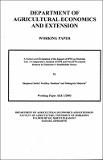| dc.contributor.author | Siziba, Shephard | |
| dc.contributor.author | Mudimu, Godfrey | |
| dc.contributor.author | Mekuria, Mulugetta | |
| dc.coverage.spatial | Zimbabwe | en_GB |
| dc.date.accessioned | 2014-12-01T13:33:38Z | |
| dc.date.available | 2014-12-01T13:33:38Z | |
| dc.date.issued | 2003-04 | |
| dc.identifier.citation | Siziba, Shephard, Mudimu, Godfrey & Mekuria, Mulugetta (2003) A Farm Level Evaluation Of The Impact Of IPM On Pesticide Use: A Comparative Analysis Of IPM And Non-IPM Trained Farmers In Zimbabwe’s Smallholder Sector, AEE Working Paper No. 1. Harare, Mt. Pleasant: AEE | en_GB |
| dc.identifier.uri | https://opendocs.ids.ac.uk/opendocs/handle/20.500.12413/5275 | |
| dc.description | An AEE Working Paper on the application of IPM in rural agricultural development in Zimbabwe. | en_GB |
| dc.description.abstract | Smallholder farmers constitute the majority of farmers in Zimbabwe. Their production systems are predominately subsistence based, in which maize accounts for over 65% of the cultivated area. Horticultural production has steadily grown to become an important additional source of income for smallholder farmers who are being encouraged to diversify to the production of high value crops. Tomatoes are an important crop grown by smallholder horticulture farmers.
Tomato production is vulnerable to pests and disease outbreaks. Currently, pest management in tomato production is characterized by a heavy dependence on chemical pesticides. Chemical pesticides are viewed as a quick and easy solution to pest problems. In Zimbabwe, and in many developing countries, chemical pesticides receive a substantial amount of government support as they are seen as the main means of reducing crop losses. However, there is mounting evidence of the negative effects of chemical pesticides on human health and the environment. Toxic substances can accumulate in the ecosystem and have a detrimental effect on non-target organisms.
Integrated Pest Management (IPM) promotes the use of all known\ (biological and cultural) environmentally benign pest control measures. Farmers are encouraged to integrate the various biological and cultural methods such that chemicals are used minimally and very judiciously. In Zimbabwe, very few farmers have had exposure to IPM because it has not been widely promoted. Given an increase in cost of agricultural inputs (including chemical pesticides) in Zimbabwe, there could be scope for wider adoption of IPM.
This study presents a preliminary assessment of the impact of IPM technology on farmers’ pest control practices, perceptions of chemical pesticides, and knowledge of non-chemical pest control alternatives. The study involved a comparative analysis of 84 non-IPM trained smallholder tomato growers and 36 IPM trained smallholder tomato growers. The farmers were surveyed in 1999 in Chinamora communal area, a horticulture farming area 50 km to the North -east of Harare.
The study findings indicate some promising implications for wider adoption of IPM by smallholder farmers. IPM training had a positive influence on farmers’ knowledge level of pests and health hazards of chemical pesticides and a negative influence on the amounts of chemical pesticides used. IPM trained farmers spent 57.5 % less on chemical pesticides than farmers not trained in IPM Nearly all (99%) IPM trained farmers knew of the five major pests of tomatoes compared to 76% of the non-IPM trained farmers. More IPM trained farmers knew and used\alternatives to chemical pesticides to control pests. IPM trained farmers anticipated yield losses of\60% due to pest damage compared to 95% perceived by non-IPM trained farmers. IPM trained farriers were more aware of both the acute and the chronic illnesses associated with exposure to chemical pesticides than non- IPM trained farmers: 80% of IPM trained farmers compared to 5% of the non-IPM trained farmers were aware.
The study concludes that policy makers should encourage the use of a pest management strategy that is information based such as IPM. This will improve the smallholders’ effective use of chemical pesticides increasing their profitability and will raise the farmers’ awareness of the health hazards of chemical pesticides. | en_GB |
| dc.language.iso | en | en_GB |
| dc.publisher | Department of Agricultural Economics and Extension ( AEE) ; University of Zimbabwe | en_GB |
| dc.relation.ispartofseries | Working Paper AEE Series;Paper No. 1/ 2003 | |
| dc.rights.uri | http://creativecommons.org/licenses/by-nc-nd/3.0/ | en_GB |
| dc.subject | Agriculture | en_GB |
| dc.subject | Rural Development | en_GB |
| dc.subject | Science and Society | en_GB |
| dc.title | A Farm Level Evaluation Of The Impact Of IPM On Pesticide Use: A Comparative Analysis Of IPM And Non-IPM Trained Farmers In Zimbabwe’s Smallholder Sector | en_GB |
| dc.type | Series paper (non-IDS) | en_GB |
| dc.rights.holder | University of Zimbabwe | en_GB |


